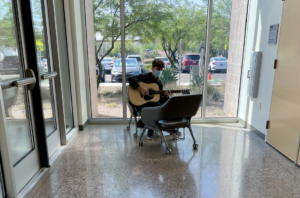Online Algebra Course Leads to Higher Achievement
“Online Algebra Course Leads to Higher Achievement” was originally published on EdNET Insight.
Effective Way To Broaden Access to Algebra I for Grade 8 Students
 WASHINGTON, Dec. 13, 2011/via PRNewswire-USNewswire/ — Eighth-grade students who are “algebra ready” and take an online Algebra I course because their schools do not offer the class, outperform their peers in algebra knowledge and are twice as likely to take advanced mathematics classes in high school. The findings are in a rigorous new federally funded study conducted by the American Institutes for Research (AIR) and Education Development Center, Inc. (EDC) for the Regional Educational Laboratory Northeast and Islands (REL-NEI).
WASHINGTON, Dec. 13, 2011/via PRNewswire-USNewswire/ — Eighth-grade students who are “algebra ready” and take an online Algebra I course because their schools do not offer the class, outperform their peers in algebra knowledge and are twice as likely to take advanced mathematics classes in high school. The findings are in a rigorous new federally funded study conducted by the American Institutes for Research (AIR) and Education Development Center, Inc. (EDC) for the Regional Educational Laboratory Northeast and Islands (REL-NEI).
The multi-year study, Access to Algebra I: The Effects of Online Mathematics for Grade 8 Students , was released December 13, 2011, by the U.S. Department of Education’s Institute of Education Sciences.
The study, the first of its kind to examine the impact of an online Algebra I course on students’ mathematics achievement and future math course enrollment, was conducted in Vermont and Maine. A total of 1,885 students from 68 schools participated in the study. Ninety percent of the schools were in rural communities.
“In schools where course offerings are limited for various reasons, online courses are increasingly used to expand students’ options,” said Jessica Heppen of AIR, lead author of the report. “The results of this study show that using an online course can be an effective way to broaden access to Algebra I in eighth grade and to create a sequence of math opportunities in the longer term.”
Peggy Clements of EDC, co-author of the report, said, “Small, rural schools—like many of those that participated in the study—may not have the resources to offer a face-to-face Algebra I course to the few students ready for it. Ordinarily, these kids would begin high school a step behind peers whose schools did offer Algebra I.”
The study found that algebra-ready (AR) students who took the online course:
Scored significantly higher on the end-of-year algebra assessment than the control group: their peers who continued with the normal mathematics curriculum
Were twice as likely to follow an advanced course sequence in high school than their peers in the control group
Did not experience any negative side effects on their end-of-year general math achievement, which is commonly tested on state assessments
The study also found that pulling out the AR students to take online Algebra I had no negative consequences for their non-AR peers who remained in the regular eighth-grade math class.
“We know the critical importance of providing Algebra I to eighth graders who are ready to take the course,” said Vermont Education Commissioner Armando Vilaseca, a member of REL-NEI’s governing board. “The research makes a compelling case for extending access to an online version of Algebra I in schools that otherwise do not typically offer the course.”
The online Algebra I course used in the study was provided by Class.com. The content of the yearlong course was similar to traditional Algebra I courses. Online instructors and students communicated with each other via online messages, and electronic scoring provided immediate feedback to students on problem sets and quizzes. Schools provided proctors to support students taking the online course. In most schools, the proctor was the teacher of the eighth-grade general math course.
The study examined Algebra I because of its relation and importance to academic achievement. Previous studies suggested that students who take an Algebra I course in the eighth grade have more success in mathematics throughout high school and college than students who take Algebra I later.
Previous research also showed that, on average, 42 percent of students who enrolled in Algebra I in 8th grade successfully completed advanced courses in high school, such as Algebra II and Geometry, by 10th grade. Further, 60 percent of students who took a calculus course in 12th grade studied Algebra I in 8th grade.
Currently, only 31 percent of eighth-grade students are enrolled in Algebra I. Nationwide, 16 percent of middle schools do not have Algebra I courses available for eighth-grade students, and these percentages are concentrated in rural schools, according to data analyses from the U.S. Department of Education’s Early Childhood Longitudinal Study.
Many public middle schools, especially those in rural areas, do not have the funds, staffing, or enrollment to offer Algebra I to AR eighth-grade students. The study concluded that the online Algebra I course is more beneficial for AR students than the eighth-grade general math course, which, the study showed, included substantial coverage of algebra topics.
The report was authored by Jessica B. Heppen, AIR; Kirk Walters, AIR; Margaret (Peggy) Clements, EDC; Ann-Marie Faria, AIR; Cheryl Tobey, EDC; Nicholas Sorensen, AIR; and Katherine Culp, EDC. It was prepared for the National Center for Education Evaluation and Regional Assistance, Institute of Education Sciences, under contract ED-06C0-0025.
To access the study go to:
http://relnei.org/research.onlinealgebra.php
About AIR
Established in 1946, with headquarters in Washington, D.C., the American Institutes for Research (AIR) is a nonpartisan, not-for-profit organization that conducts behavioral and social science research and delivers technical assistance both domestically and internationally in the areas of health, education, and workforce productivity. Visit www.air.org.
About EDC
Education Development Center, Inc. (EDC),is a global nonprofit organization that develops, delivers, and evaluates innovative programs to address some of the world’s most urgent challenges in education, health, and economic development. Visit www.edc.org.
About REL-NEI
The Regional Educational Laboratory Northeast and Islands (REL-NEI) is run by EDC in partnership with AIR and WestEd’s Learning Innovations program. REL-NEI is one of 10 regional educational laboratories funded by the Institute of Education Sciences at the U.S. Department of Education. REL-NEI provides rigorous research that is relevant to national education priorities, responsive to local needs, and usable for policy and practice. Visit www.relnei.org.




0 Comments
Leave a Comment
Your email address will not be published. All fields are required.